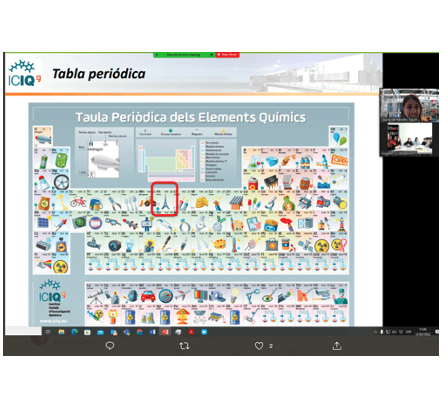Bringing scientific dialogue to supervised centres and the adult training centre of Can Brians
This July will end the fourth edition of the project “Extended Learning Time IV: Contributing to generating scientific vocations in supervised centres” led by researcher Regina Gairal of Universitat Rovira i Virgili’s research group MEDIS (Methodology of Educational Research with Social Impact), in which ICIQ Outreach manager Dr. Laura Hernández also participates.
This edition was designed to be adapted to COVID-19 and, therefore, the project has been able to be carried out in both virtual and face-to-face mode. It consists of the launch of Scientific Talks, in which participants have the opportunity to share scientific reads and discuss their contributions, which have been selected by experts in various fields who also conduct the training sessions. There have also been scientific workshops on the topics of the talks.
The project is being implemented in the Residential Centers for Educational Action (CRAE) Pastoreta (Reus), Voramar (Tarragona) and Sant Josep (Tarragona) and also in the sheltered housing for young people Ángeles Custodios (Santander). Through the new virtual modality, the project has been developed in the Artur Martorell adult training center, located in the Can Brians penitentiary center. Specifically, it was a group of men participating in the adult training centre who were able to follow the Dialogue Scientific Talks and the scientific workshops given by different scientists. A total of 12 sessions were held at these centres, in which almost 40 people participated.
The researchers who have taken part in the project have been Maite Novo, researcher in Didactics of Experimental Sciences at the URV, Laura Hernández, head of the Scientific Dissemination and Education Unit at ICIQ, Miquel Guardiona, technician in the socialization area of the Catalan Institute of Human Paleoecology and Social Evolution (IPHES ), Laureano Jiménez, Professor of Chemical Engineering at the URV and, Núria Ruiz, researcher in the Department of Chemistry, Physics and Inorganics of the URV.
The project is expected to be completed in July, when the social impact achieved by implementing Successful Educational Actions in different highly vulnerable contexts will be assessed. This project has been funded by the Spanish Foundation for Science and Technology (FECYT).
Related news

Let's create a brighter future
Join our team to work with renowned researchers, tackle groundbreaking
projects and contribute to meaningful scientific advancements







 20-12-2024
20-12-2024 


















